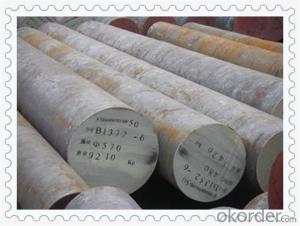ASTM 1080 Carbon Steel Round Bars
- Loading Port:
- China main port
- Payment Terms:
- TT OR LC
- Min Order Qty:
- 30 m.t.
- Supply Capability:
- 10000 m.t./month
OKorder Service Pledge
OKorder Financial Service
You Might Also Like
ASTM 1080 Carbon Steel Round Bars
Products Details
1.Characteristics
1) Even material.
2) Good machinability and polishability.
3) High toughness and high plasticity.
4) High abrasive resistance in high temperature.
5) Excellent total hardenability.
6) Low deformability during heat treatment.
7) Better isotropy.
2.Application
1) Diecasting mould(mold, fixed block, upper die, jet nozzle, nitride thimble ).
2) Extrusion die(mold, supporting member, choke blocks).
3) Hot press die. (aluminum, magnesium, copper alloy)
4) Parts, such as cold cutting, overlap, hot shears, wearable parts.
5) Important parts for aviation industry.
We can produce one hundred kinds of products, including cold work tool steel, hot work tool steel, plastic mould steel and many other alloy tool steel. We are mainly supplying tool steels as below aboard:
AISI: D2, D3, D6, D7, A2, A6, A8, A10, H10, H11, H13, H21, S1, S5, S7, O1, O6;
DIN: 1.2080, 1.2316, 1.2343, 1.2344, 1.2379, 1.2510, 1.2601, 1.2713, 1.2714, 1.2767, 1.2842;
JIS: SKD1, SKD11, SKD61, DC53;
GB: Cr12, Cr12MoV, Cr12Mo1V1, 6CrW2Si, 4Cr5MoSiV, 4Cr5MoSiV1, 3Cr2W8V.
3. Chemical composition of steel bar
| Standard | C | Si | Mn | Cr | Ni | P/S ≤ |
| DIN | ≤0.15 | ≤1.0 | ≤2.0 | 18 | 9 | 0.03 |
| GB | ≤0.15 | ≤1.0 | ≤2.0 | 18 | 9 | 0.03 |
4.Material and Grade
| Material | Grade | Material | Grade |
| 8#-10# | φ16-290 | 65Mn | φ40-300 |
| 15# | φ14-150 | 45Mn2 | φ18-75 |
| 20# | φ8-480 | 60Si2Mn | φ16-150 |
| 35# | φ8-480 | 20CrMnTi | φ10-480 |
| 45# | φ6.5-480 | 20CrMnTiB | φ16-75 |
| Q235B | φ6.5-180 | GCr15 | φ16-400 |
| 40Cr | φ8-480 | ML35 | φ8-150 |
| 20Cr | φ10-480 | T8-T13 | φ8-480 |
| 42CrMo | φ12-480 | Cr12 | φ16-300 |
| 35CrMo | φ12-480 | Cr12MoV | φ16-300 |
| 20CrMo | φ12-300 | 3Cr2W8V | φ16-300 |
| 38CrMoAL | φ20-300 | 45Cr50Cr | φ20-300 |
| 5CrMnMo | φ20-450 | 20CrMnMo | φ20-300 |
| 16Mn(Q345B) | φ14-365 | 40Mn2 | φ28-60 |
| 50Mn | φ40-200 | 35Cr | φ55 |
| 15CrMo | φ21 φ24 φ75 | 15Mn | φ32φ170 |
| 25# | φ16-280 | 40CrMnMo | φ80φ160 |
| YF45MnV | φ28-80 | 20CrMnMo | φ20-300 |
| 30# | φ6.5-480 | 27SiMn | φ20-350 |
| 30CrMo | φ28 | Crwmn | φ20-300 |
| 30CrMnTi | φ16-300 | H13(4Cr5MoSiVi) | φ20-300 |
| 60# | φ210 φ260 | 40CrNiMo | φ20-400 |
Products Show
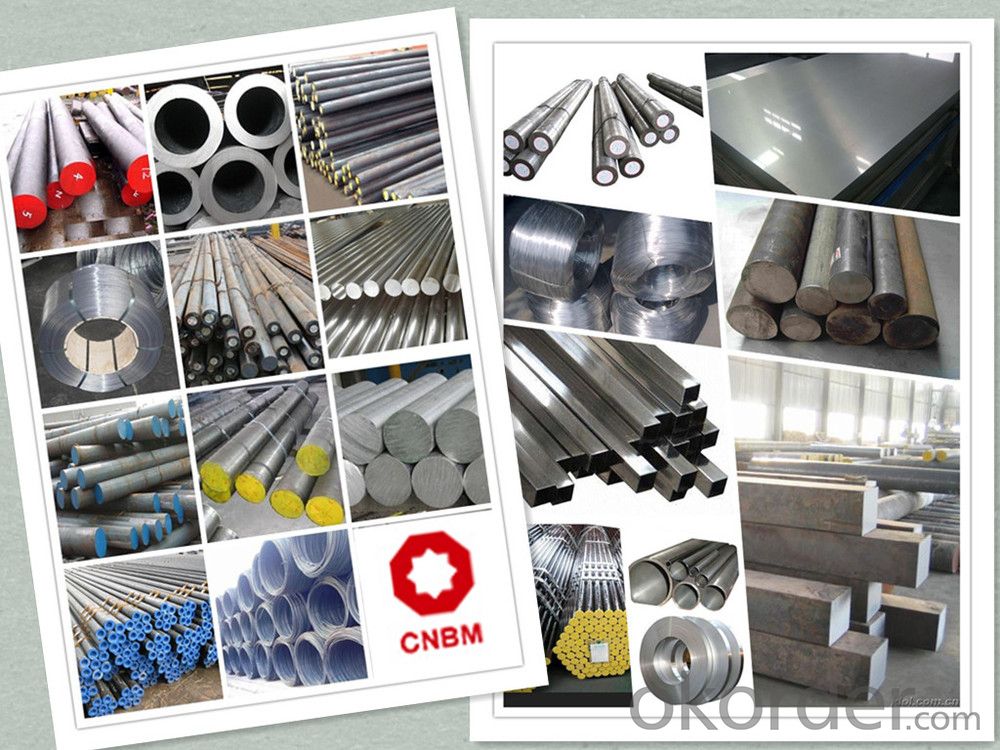
Product Overviews
| Product Name | Typical Grades | Diameter(mm) | Standard adopted |
| Carbon Steel | 20 (1020/S20C/C22) | Ø16-Ø300 |
GB/SAE/JIS/DIN
|
| 40 (1040/S40C/C40) | |||
| 45 (1045/S45C/C45) | |||
| Bearing Steel | GCr9 (51100/SUJ1) | Ø12-Ø250 | |
| GCr15 (52100/SUJ2/100Gr6) | |||
| GCr9SiMn (A485-Gr.1/SUJ3) | |||
Cr-Mo Steel | 20Cr (5120/SCr420H/20Cr4) | Ø12-Ø250 | |
| 40Cr (5140/SCr440/41Cr4) | |||
| 42CrMo(4140/SCM440/42CrMo4) | |||
| Gear Steel | 20CrNiMo | Ø16-Ø600 | |
| 20CrMn(5115/SMnC420/20MnCr5) | |||
| 20CrNiMo(8620/SNCM220/20CrMiMo2) |
Application
| Carbon Steel | Mold bottom, Plastic mold, Construction machinery parts Automobile parts, Security grills, Screens, Construction |
| Bearing Steel | Aerospace, Navigation, Nuclear energy, Chemical industry Electronic information, Petrochemical, Instrument and meter Transportation |
| Cr-Mo Steel | Mechanism & Fasteners gear, Stressed components for vehicles Engines and machines, Parts of larger cross-section |
| Gear Steel | All kinds of gears, Statically and dynamically stressed component for vehicles Engines and machine, Larger cross-section parts, Crankshafts |
Work Shop
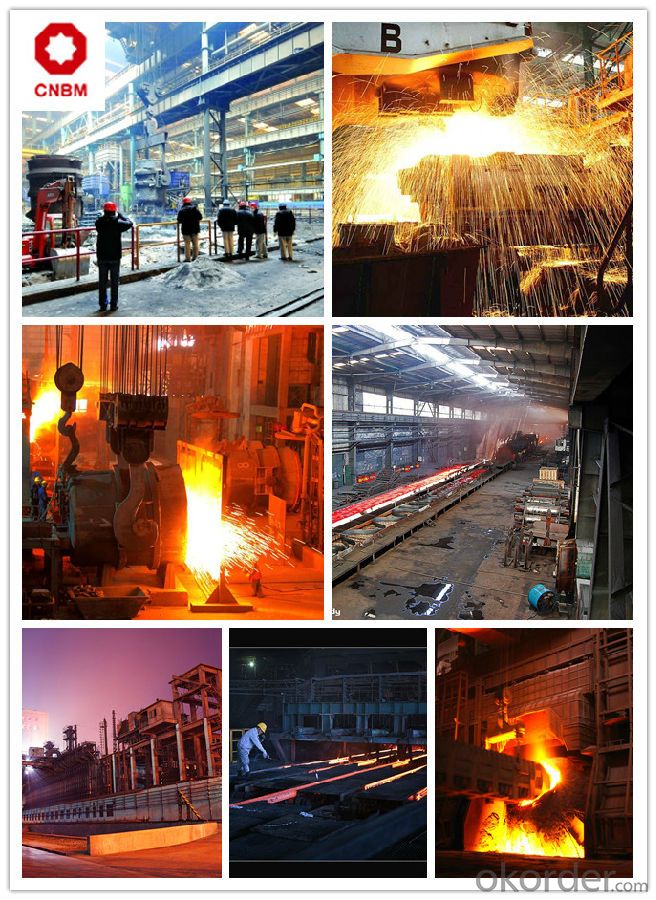
Company Information
CNBM International Corporation is the most important trading platform of CNBM group.
Whith its advantages, CNBM International are mainly concentrate on Cement, Glass, Iron and Steel, Ceramics industries and devotes herself for supplying high qulity series of refractories as well as technical consultancies and
logistics solutions.

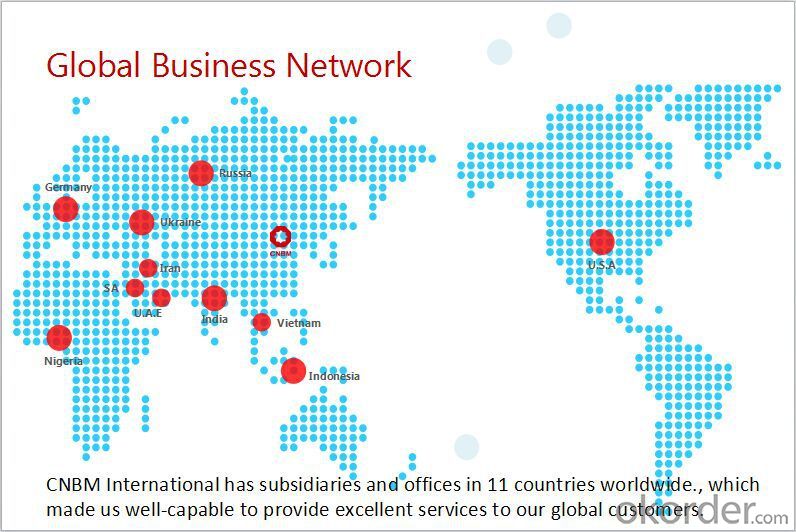
FAQ
1, Your advantages?
professional products inquiry, products knowledge train (for agents), smooth goods delivery, excellent customer solution proposale
2, Test & Certificate?
SGS test is available, customer inspection before shipping is welcome, third party inspection is no problem
3, Factory or Trading Company?
CNBM is a trading company but we have so many protocol factories and CNBM works as a trading department of these factories. Also CNBM is the holding company of many factories.
4, Payment Terms?
30% TT as deposit and 70% before delivery.
Irrevocable L/C at sight.
5, Trading Terms?
EXW, FOB, CIF, FFR, CNF
6, After-sale Service?
CNBM provides the services and support you need for every step of our cooperation. We're the business partner you can trust.
For any problem, please kindly contact us at any your convenient time.
We'll reply you in our first priority within 24 hours.
Packaging & Delivery
1, Packaging: seaworthy package or as required
2, Delivery: 35-45 days or based on quantity
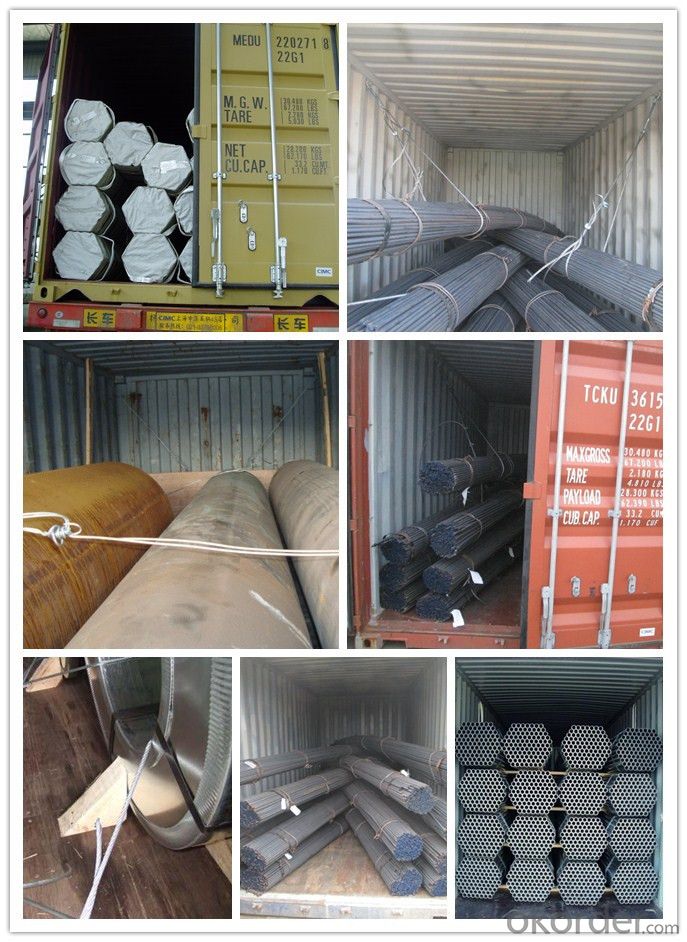
- Q:How is the weight of a steel round bar calculated?
- The weight of a steel round bar is calculated using a formula that takes into account the diameter of the bar, the length of the bar, and the density of the specific type of steel being used. The formula is as follows: Weight = (π/4) x (diameter)^2 x length x density In this formula, π represents the mathematical constant pi (approximately 3.14159), the diameter is the measurement across the widest point of the round bar, the length is the measurement of the bar from end to end, and the density is the mass per unit volume of the specific type of steel. By plugging in the values for diameter, length, and density into this formula, you can calculate the weight of a steel round bar. Keep in mind that the weight will be in units of mass, such as kilograms or pounds, depending on the system of measurement being used.
- Q:What are the advantages of using aluminum-silicon alloy steel round bars?
- There are several advantages of using aluminum-silicon alloy steel round bars: 1. Lightweight: Aluminum is a lightweight material, and when alloyed with silicon, it further enhances the strength-to-weight ratio, making the round bars lighter and easier to handle. This is particularly beneficial in applications where weight reduction is crucial, such as aerospace and automotive industries. 2. High strength: Aluminum-silicon alloy steel round bars possess excellent mechanical properties, including high tensile strength and good yield strength. This allows them to withstand heavy loads and provide structural integrity in various applications. 3. Corrosion resistance: Aluminum-silicon alloy steel round bars offer good corrosion resistance, especially in environments where moisture or chemicals are present. This makes them suitable for applications where exposure to harsh conditions or corrosive substances is a concern. 4. Thermal conductivity: Aluminum-silicon alloy steel round bars have excellent thermal conductivity, which allows for efficient heat transfer. This property is particularly advantageous in industries such as heat exchangers, where effective thermal management is essential. 5. Machinability: Aluminum-silicon alloy steel round bars are relatively easy to machine, allowing for precise shaping and forming. This makes them ideal for applications where intricate designs or specific dimensions are required. 6. Cost-effectiveness: Compared to other materials, aluminum-silicon alloy steel round bars offer a cost-effective solution due to their relatively low production and maintenance costs. This makes them a popular choice in various industries, including construction, automotive, and manufacturing. 7. Recyclability: Aluminum-silicon alloy steel round bars are highly recyclable, which is crucial in today's environmentally conscious world. Recycling aluminum-silicon alloys requires significantly less energy compared to primary production, making them a sustainable choice. Overall, the advantages of using aluminum-silicon alloy steel round bars include their lightweight nature, high strength, corrosion resistance, thermal conductivity, machinability, cost-effectiveness, and recyclability. These properties make them a versatile material for a wide range of applications across different industries.
- Q:How do steel round bars perform under static or stationary loads?
- Steel round bars are renowned for their exceptional performance when subjected to static or stationary loads. With their high level of strength and durability, steel round bars have the ability to endure heavy weights or forces without experiencing significant deformation or failure. When faced with static loads, these bars evenly distribute the applied force throughout their structure, guaranteeing stability and maintaining structural integrity. One of the primary benefits of steel round bars is their resistance to bending or sagging under static loads. Their inherent rigidity enables them to preserve their shape and prevent substantial deflection, rendering them ideal for applications that require significant load-bearing capacity. Additionally, steel round bars possess a high yield strength, granting them the capability to withstand substantial stress before permanent deformation takes place. Moreover, steel round bars exhibit minimal creep under static loads, signifying that they maintain their shape and dimensions over time, even when exposed to sustained pressure. This attribute proves particularly vital in structures or equipment that are expected to support constant loads for extended durations. Another element that contributes to the outstanding performance of steel round bars under static loads is their resistance to corrosion. Steel inherently resists rust and oxidation, rendering it suitable for use in various environments, including those with high levels of humidity or exposure to moisture. In conclusion, steel round bars are exceedingly dependable and efficient when it comes to managing static or stationary loads. They offer exceptional strength, resistance to deformation, and durability, making them the preferred choice across a wide array of industries, such as construction, manufacturing, and infrastructure development.
- Q:Are steel round bars susceptible to rust?
- It is true that rust can occur on steel round bars. Rust is the outcome of a chemical reaction involving iron and oxygen in the presence of moisture. Due to the fact that steel is primarily composed of iron, it can rust if it is exposed to air and moisture. Nevertheless, the likelihood of rust can be decreased by taking specific precautionary measures. To establish a barrier between the steel and the surrounding environment, steel round bars can be coated with protective layers such as paint, oil, or galvanized coatings. This effectively prevents or delays the initiation of rust. In order to minimize the risk of rust formation on steel round bars, it is advisable to regularly maintain them by cleaning and reapplying protective coatings.
- Q:How to make the round welds on flat steel flat and qualified?
- On both sides of the steel and welded steel plate, each side of the weld length of 5 times the diameter of reinforcement, welding seam should be welded into a convex arc that is.
- Q:How are steel round bars manufactured?
- Steel round bars are typically manufactured through a process known as hot rolling, where a large steel billet is heated and passed through a series of rollers which gradually shape and size it into a round bar. This process ensures the bar's uniformity, strength, and durability, making it suitable for various applications in industries such as construction, manufacturing, and engineering.
- Q:What is the difference between a hot-rolled and a peeled steel round bar?
- A hot-rolled steel round bar is produced by heating a billet or ingot until it reaches a temperature where the material can be easily shaped or formed. Once heated, the steel is rolled through a series of rollers to achieve the desired shape and size. The process of hot rolling creates a bar with a rough surface texture and a slightly rounded edge. On the other hand, a peeled steel round bar undergoes a different manufacturing process. It is first hot-rolled to achieve the desired shape and size, similar to the hot-rolled bar. However, after the initial hot rolling, the peeled bar is subjected to a mechanical peeling process. This involves removing the outer layer of the bar to achieve a smooth, shiny surface finish. The peeling process also helps to improve the dimensional accuracy and surface quality of the bar. In summary, the main difference between a hot-rolled and a peeled steel round bar lies in the surface finish and dimensional accuracy. While a hot-rolled bar has a rough surface texture and a slightly rounded edge, a peeled bar has a smooth, shiny surface finish with improved dimensional accuracy. The peeling process enhances the overall quality and appearance of the steel round bar, making it more suitable for applications where aesthetics or precision is important.
- Q:What is the difference between a polished and a precision ground steel round bar?
- A polished steel round bar is a bar that has been polished to achieve a smooth and shiny surface. This involves using abrasive materials to eliminate any flaws or roughness. As a result, the bar is visually appealing and has a high level of aesthetic appeal. On the other hand, a precision ground steel round bar is a bar that has been ground precisely to achieve accurate dimensions and a smooth surface. This grinding process involves removing material from the bar's surface using grinding wheels or other cutting tools. The aim of precision grinding is to ensure that the bar meets specific size and shape requirements, making it suitable for applications that require precise dimensions and tight tolerances. In conclusion, the main difference between a polished and a precision ground steel round bar lies in the purpose of the respective finishing processes. Polishing is primarily done for aesthetic reasons, enhancing the bar's appearance, while precision grinding focuses on achieving precise dimensions and tight tolerances to meet specific technical requirements.
- Q:How to distinguish a round bar from forging? Cold drawing? Hot rolling?
- Hot rolled round steel, used in construction and general hardware parts processing is very common. Cold drawn round steel (do not know is not cold dial round bar). But I understand by the cold dial round bar Also mainly used in hardware parts processing and production. Such as hinge shaft core or other surface and diameter requirements of production and processing occasions.
- Q:Can steel round bars be used for making stabilizer bars?
- Stabilizer bars can indeed be made using steel round bars. The automotive industry commonly employs steel due to its exceptional durability, high strength, and resistance to deformation. Stabilizer bars, also referred to as sway bars, are crucial components in a vehicle's suspension system. Their purpose is to enhance stability while cornering and minimize body roll. These bars endure substantial forces and must possess the ability to withstand heavy loads. Steel round bars offer the essential strength and rigidity necessary for stabilizer bars to effectively fulfill their function. Moreover, steel is easily accessible and cost-effective, which contributes to its popularity as a preferred material for manufacturing stabilizer bars in the automotive industry.
1. Manufacturer Overview |
|
|---|---|
| Location | |
| Year Established | |
| Annual Output Value | |
| Main Markets | |
| Company Certifications | |
2. Manufacturer Certificates |
|
|---|---|
| a) Certification Name | |
| Range | |
| Reference | |
| Validity Period | |
3. Manufacturer Capability |
|
|---|---|
| a)Trade Capacity | |
| Nearest Port | |
| Export Percentage | |
| No.of Employees in Trade Department | |
| Language Spoken: | |
| b)Factory Information | |
| Factory Size: | |
| No. of Production Lines | |
| Contract Manufacturing | |
| Product Price Range | |
Send your message to us
ASTM 1080 Carbon Steel Round Bars
- Loading Port:
- China main port
- Payment Terms:
- TT OR LC
- Min Order Qty:
- 30 m.t.
- Supply Capability:
- 10000 m.t./month
OKorder Service Pledge
OKorder Financial Service
Similar products
New products
Hot products
Related keywords
